Bulbs
Flower Basics
Flower Beds & Specialty Gardens
Flower Garden
Garden Furniture
Garden Gnomes
Garden Seeds
Garden Sheds
Garden Statues
Garden Tools & Supplies
Gardening Basics
Green & Organic
Groundcovers & Vines
Growing Annuals
Growing Basil
Growing Beans
Growing Berries
Growing Blueberries
Growing Cactus
Growing Corn
Growing Cotton
Growing Edibles
Growing Flowers
Growing Garlic
Growing Grapes
Growing Grass
Growing Herbs
Growing Jasmine
Growing Mint
Growing Mushrooms
Orchids
Growing Peanuts
Growing Perennials
Growing Plants
Growing Rosemary
Growing Roses
Growing Strawberries
Growing Sunflowers
Growing Thyme
Growing Tomatoes
Growing Tulips
Growing Vegetables
Herb Basics
Herb Garden
Indoor Growing
Landscaping Basics
Landscaping Patios
Landscaping Plants
Landscaping Shrubs
Landscaping Trees
Landscaping Walks & Pathways
Lawn Basics
Lawn Maintenance
Lawn Mowers
Lawn Ornaments
Lawn Planting
Lawn Tools
Outdoor Growing
Overall Landscape Planning
Pests, Weeds & Problems
Plant Basics
Rock Garden
Rose Garden
Shrubs
Soil
Specialty Gardens
Trees
Vegetable Garden
Yard Maintenance
How to Grow Big Vegetables
How to Grow Big Vegetables. Whether you are new to gardening, or have been gardening for years, the goal of growing vegetables is to grow big, juicy fruits that provide the nutrition and flavor your family expects. There is no magic substance to create big vegetables, unless of course you grow a variety that produces large fruit; but if you follow...

Whether you are new to gardening, or have been gardening for years, the goal of growing vegetables is to grow big, juicy fruits that provide the nutrition and flavor your family expects. There is no magic substance to create big vegetables, unless of course you grow a variety that produces large fruit; but if you follow good gardening techniques, you will produce healthy, robust fruit brimming with flavor.
Things You'll Need
Soil test kit
Garden tiller
Water-soluble fertilizer
Select an area for your garden that is well-drained and receives full sun for a least six to eight hours a day. Observe the area throughout the day, and keep in mind that trees may cast a shadow on the area once they have leaved-out fully. Avoid any areas where the soil remains soggy after rain, or has standing water in early spring.
Test your soil prior to preparing the garden bed. Purchase an inexpensive kit at your local hardware or home improvement store to perform your own soil test. Follow the instructions included in the kit for testing the soil. Contact your local university cooperative extension office to have your soil tested professionally, if you prefer. For a small fee, you can send a soil sample to them for analysis.
Prepare the garden bed by tilling to a depth of eight to ten inches. Remove any rocks or other debris. Add any recommended amendments and work them in well.
Plant seeds or seedlings following the recommended depth and spacing. Avoid the temptation to overcrowd vegetables, as this will inhibit growth and reduce the size of fruit.
Provide adequate water. Plants require more water during fruit production. Failure to provide adequate water will inhibit the growth of your vegetables. As a general rule, allow the soil to dry slightly before watering. Some plants require more or less water. Always refer to the growing needs of your specific vegetable plants.
Apply water-soluble fertilizer every two weeks throughout the summer to boost growth and encourage fruiting. Fertilizers high in phosphorus promote blooming and fruit formation. Those high in nitrogen encourage lush, green foliage, but may inhibit fruiting.
Remove all weeds that grow near your plants. Not only do they make it difficult to harvest vegetables, they rob them of valuable nutrients and moisture. Pull weeds from the roots or cut them with the blade of a hoe. Use care not to disturb the roots of your vegetables.
Monitor your garden closely for any signs of insects or disease, and treat promptly. Disease spreads quickly and can damage your entire crop if not dealt with immediately.